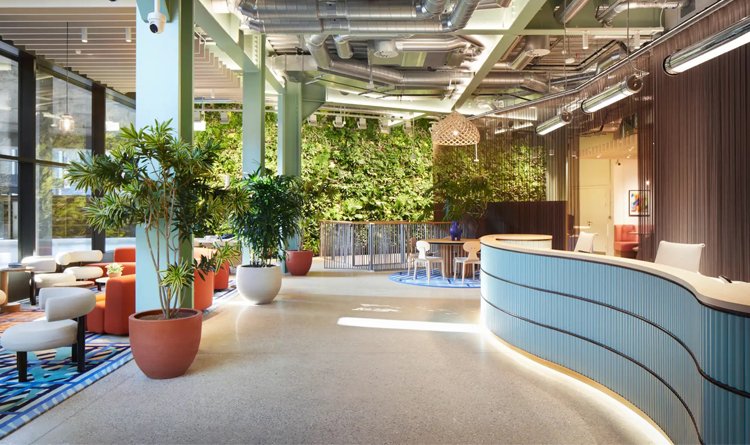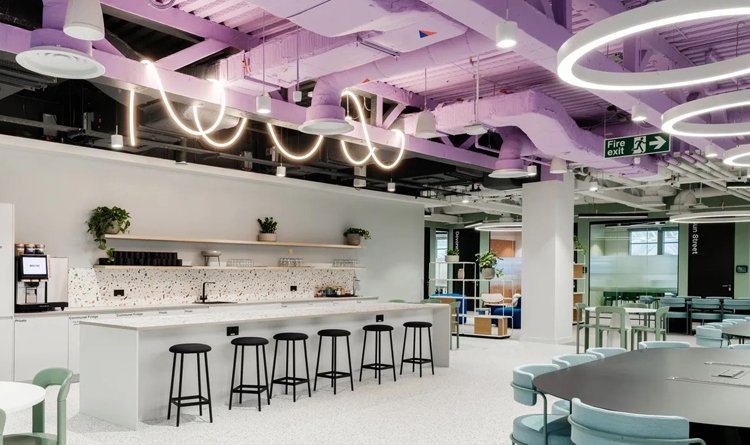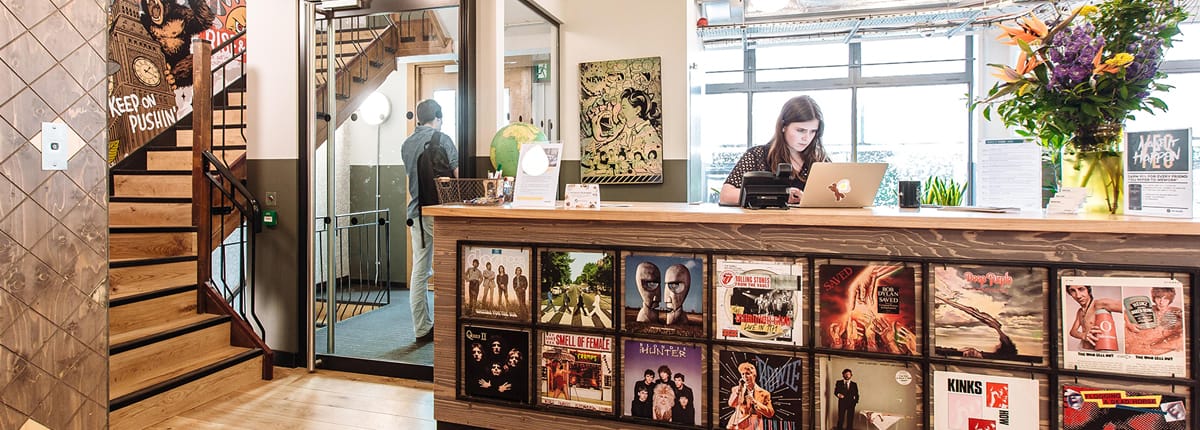
From Idea to HQ: How to Choose Your Perfect Startup Office Space in London
Starting a business is an exciting journey, filled with ups and downs, accompanied by a few ‘Are we nearly there moments’. Yet one of the most notable milestones for any small business owner has to be setting up their first office.
As your startup grows, your office needs will shift. What works for a two-person team won’t suit a ten-person office. Early-stage businesses often prioritise flexibility and affordability, while scale-ups seek a space that reflects their brand and supports team structure. Knowing where you are in that journey helps you find an office that won’t limit your momentum.
Finding the right office space can boost productivity, enhance collaboration, and reinforce company culture. However, it occasionally comes with challenges, and compromises between choosing the right location and budgeting effectively.
This post will guide you through everything you need to know to establish an efficient and cost-effective office space for your startup.
Startup Office Space – Flexible, Affordable Startup Offices in London.

A welcoming reception team can make a long-lasting impression on your business for onsite meetings.
1. Define Your Office Needs
Before beginning to search for office space, clearly define what you need the office to do for you. Ask yourself:
How many employees will be using the space? Consider both current staff and expected hires in the next year.
What kind of work environment suits your company culture? Open-plan offices promote collaboration, while private offices may be necessary for confidentiality.
Do you need access to meeting rooms, breakout spaces, or event areas?
What technology and infrastructure are required? Ensure high-speed internet, phone systems, and IT support are available.
Clearly outlining these factors will help you avoid overspending on unnecessary amenities while ensuring your space remains functional.
2. Get It Right from Day One: Choosing the Right Office Space
Coworking offers flexibility and networking, while serviced offices add privacy and a professional edge. Managed offices sit in the middle, giving startups more control over layout and branding—ideal for growing teams.
If you’re scaling fast but not ready for a leasehold, managed space offers room to grow without long-term risk. Your office location plays a crucial role in your success. Consider the following when selecting an office:
Location and Accessibility
A centrally located office with good transport links makes commuting easier for employees and visiting clients. Look for areas with:
Good public transport connections (bus, train, or underground access)
Nearby parking for employees who drive
Proximity to key business hubs or industry-specific districts
Startup Office Space Types: Leased vs. Serviced vs. Coworking Spaces
Traditional Leased Offices – Long-term contracts that provide stability but require more financial commitment and upfront investment in furniture and utilities.
Serviced Offices – Ready-to-use spaces with flexible lease terms, including amenities such as internet, reception services, and meeting rooms.
Coworking Spaces – Ideal for startups needing affordable, collaborative environments with short-term flexibility and networking opportunities.
All-Inclusive Simplicity with Coworking
Coworking spaces are ideal for early-stage startups that want to get moving quickly. Startup office spaces tend to include desks and chairs and come ready to use with fast Internet, access to meeting rooms, and utilities all wrapped into one simple monthly cost. It’s a zero-fuss option that avoids the time and expense of setting up a traditional office from scratch.
Coworking spaces are open-plan environments with shared amenities and community events. Memberships are typically month-to-month, and you can choose between hot desks (first come, first-served) and dedicated desks (reserved for you). Popular coworking spaces and office spaces for startups in London include WeWork, FORA, Huckletree & LABS.
✔ Flexibility: Many coworking spaces provide flexible month-to-month memberships, making it easier to adapt the space as your team evolves.
✔ All-Inclusive Costs: Most coworking spaces cover utilities, internet, and amenities in the membership fee.
✔ Community and Networking: Coworking fosters a social environment, which is great for collaboration and building connections with other startups.
✘ Privacy Concerns: Shared spaces mean limited privacy and potential distractions.
✘ Less Control over Space: You have a Limited ability to brand or customize the area to reflect your company personality.
Traditional Office & Managed Offices
Managed offices combine traditional and serviced spaces, providing customization with flexible lease terms. These offices can be tailored to represent your brand, featuring furnishings and layouts designed for your team.
✔ Privacy and Brand Control: A traditional office provides a dedicated, branded space – ideal for client visits and building team culture.
✔ Customization: You can personalize the office layout, furniture, and décor to fit your brand requirements.
✘ Higher Initial Costs: Furniture, utilities, and setup fees can be costly.
✘ Long-Term Commitment: Traditional office leases typically require a 3–5-year commitment, which can be restrictive for startups needing flexibility or having the financial backing/accounts to secure the lease.
Serviced Offices
Serviced offices provide private suites within shared buildings, with amenities such as reception services, IT support, and access to communal breakout areas. Examples of serviced office providers include WeWork and Landmark. Both of which offer flexible lease terms.
✔ Privacy: You can get a private office space while retaining access to shared facilities.
✔ Flexible Leases: Shorter, flexible lease options reduce long-term commitments.
✔ Fully Furnished: Offices typically include furniture, reducing upfront costs.
✘ Potentially More Costly: While less than a traditional lease, serviced offices can be more expensive than coworking memberships.
✘ Company Signage & Branding: Similar to coworking, serviced offices share resources and areas of the building with other tenants. This may restrict your potential to reflect your brand within the space. Therefore, we advise checking if signage and manifestation to glazing (company logo/impact graphics) are allowed before later finding they aren’t and being asked to take it down.

Leased workspace by British Land on Blossom Street.
3. Avoid These Costly Mistakes: Budgeting For Startup Office Space
A well-planned budget ensures you keep cash flow in check and do not overspend. Consider the following expenses:
Rent & Deposit – This will likely be one of the higher expenses in your monthly expenditure. Office rent varies based on location, type of office space (traditional, coworking, or serviced office), and lease terms. For small teams in London, you might pay anywhere from £500–£1,500 per desk monthly. Renting a private office in a coworking space may provide more flexibility in lease terms and amenities vs traditional leases. Overall, the initial setup cost for a small office can range from £5,000 to £10,000. As rent tends to impact cash in the bank the most, we advise comparing a few quotes before committing to the space.
Utilities & Internet – Some offices include utilities in the rent, while others charge separately. Utilities such as electricity, heating, water, and high-speed internet are essential for office operations. In a traditional office space, these might cost between £200–£500 monthly, depending on office size and usage. Many coworking spaces and serviced offices include utilities in the rental fee, which can simplify budgeting.
Furniture & Equipment – Essential items include desks, chairs, storage, and computer equipment. For a basic setup, expect to budget around £3,000–£5,000 for furniture and equipment for a small team. Furniture is often included if you choose a serviced or coworking space, reducing your upfront costs.
Maintenance & Cleaning Services – These are often overlooked but essential for a well-functioning office.
Insurance & Legal Fees – Protect your business from liability issues.
Tip: Startups should look for spaces with all-inclusive pricing to avoid hidden costs.
4. Avoid Missing Out: Funding and Cost-Saving Tips for Startup Office Space
If you are on a tight budget, explore funding options such as:
Government Grants & Startup Loans – Many countries have government-back incentives and offer financial support for new businesses.
Business Incubators & Accelerators – Some provide free or discounted office space in exchange for equity.
Shared Offices & Subleasing – Renting unused office space from another company can significantly cut costs when setting up your startup office.
Buying Second-Hand Furniture – Save money by purchasing used office furniture from online marketplaces.
5. Don’t Overlook Business Support Networks
Workspace providers such as Workspace Group and FORA often run accelerator programmes, pitch events, or invite-only networking evenings, giving startups access to other business communities. This environment can open doors to partnerships, advisors, and investors without needing to attend countless external events.
6. Design Your Dream Startup Office: Office Layout Tips for Productivity
Your office layout impacts productivity, collaboration, and employee satisfaction. Consider:
Open vs. Closed Layouts – Open plans encourage teamwork, while private offices provide focus.
Breakout Areas & Relaxation Spaces – These are Essential for creativity and informal meetings.
Ergonomic Furniture – Adjustable chairs and standing desks improve comfort and health.
Natural Light & Ventilation – Boosts productivity and reduces fatigue.

Premium office space with Uncommon in Holborn features a communal bar and coworking lounge.
7. Future-Proof Your Startup Office Space: Technology & Infrastructure Setup
Investing in the right technology ensures smooth operations. Key essentials include:
High-Speed Internet – A non-negotiable for any business.
Cloud-based software & Storage – Improve collaboration and secure data.
Video Conferencing & Communication Tools are vital for remote teams.
Security Systems – CCTV, keycard access, and fire alarms for safety.
8. Consider Built-In Tech Support
Most serviced office providers in London offer built-in IT support as standard. For startups without a dedicated tech team, this can prevent hours of wasted time troubleshooting Wi-Fi issues or setting up hybrid meetings. Spaces managed by operators like FORA and WeWork typically include fast Wi-Fi, managed printers, secure access control, and AV-equipped meeting rooms – all bundled into a simple agreement.
9. Protect Your Business: Startup Offices – Legal and Compliance Considerations
Ensure your startup office space complies with all necessary legal regulations, including:
Business Registration & Licensing – Check if your office needs specific permits.
Health & Safety Standards – Fire safety, emergency exits, and first aid stations.
Data Protection (GDPR Compliance) – If handling client data, ensure compliance with privacy laws.
Employee Contracts & Workplace Policies – Clearly define remote work policies, office conduct, and flexible work arrangements.
10. The Blueprint to Growth: Scalability & Growth Planning
Your office should accommodate future growth without frequent relocations. Consider:
Flexible Lease Terms – Short-term contracts or offices with expansion options.
Modular Office Furniture – Adjustable workspaces can be reconfigured as the team grows.
Remote Work Capabilities – A hybrid setup allows for a mix of office and remote work to reduce space constraints.
11. Master Hybrid Work: Remote & Hybrid Work Considerations
Many startups adopt a hybrid work model, but not every startup needs a full-time private office. Shared or part-time office space—where two businesses split usage across the week—is gaining popularity, especially for hybrid teams. It keeps costs low and maximises efficiency without sacrificing professionalism or amenities. If you’re only in the office a few days a week, it’s a smarter workaround.
Hot-Desking Solutions – Employees book desks only when needed.
Meeting Room Management – Schedule shared spaces efficiently.
Collaboration Tools – Slack, Zoom, or Microsoft Teams facilitate communication.
Virtual Office Addresses – Use these for mail handling and business registration if you primarily work remotely.

Many serviced offices have shared kitchen facilities and breakout areas for coworking.
12. Start Strong: Moving In & Making It Feel Like Home
Once you have secured your office, focus on the following:
Branding & Office Aesthetics – Wall art, company logos, and inspiring decor.
Employee Comfort – Stocking up on snacks, coffee, and ergonomic accessories.
Team Bonding & Office Culture – Create an inviting space where employees want to work.
Our Final Thoughts on Startup Offices
Setting up your first office is a big step for any startup. By choosing the right location, planning your budget, and designing a space that supports productivity, you’ll create an environment where your business can thrive. Keep scalability and flexibility in mind and invest in technology that enables remote work and collaboration.
By following this office space for startups guide, your startup will be well-prepared to create an office space setup for success. We are here to help make the office search as seamless and rewarding as possible. We provide independent, free advice to help businesses find a workspace that works for them.
If you’re ready to explore startup office space in London, platforms like ours simplify the process by comparing trusted providers across flexible terms, locations, and budgets. Whether you want to tour a sleek Soho coworking lounge or secure a serviced suite near Old Street, we’ll help you get verified pricing, saving you the hassle and time spent doing it yourself.



